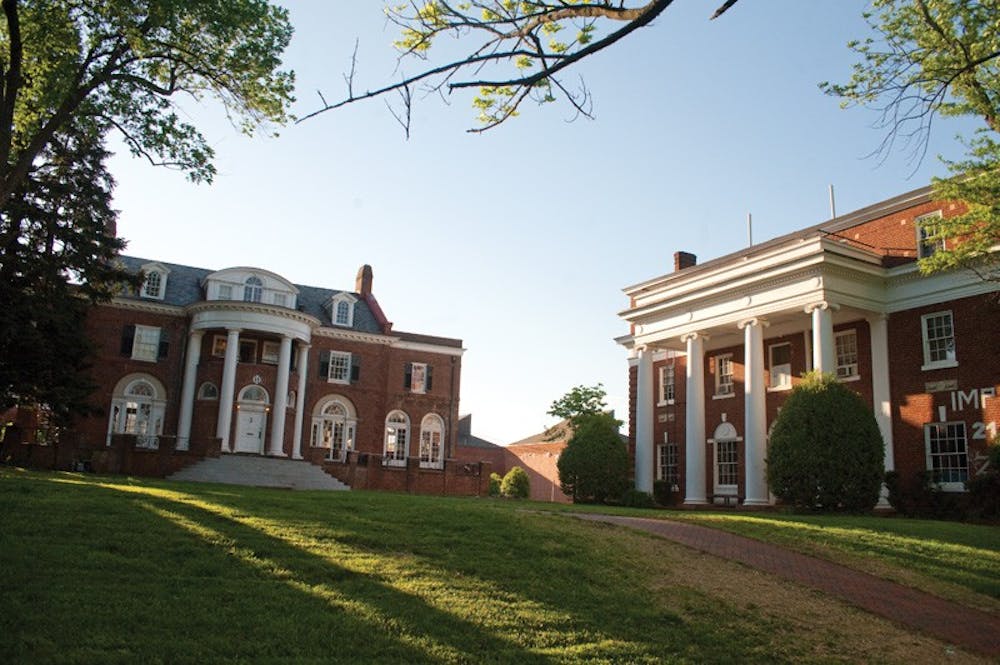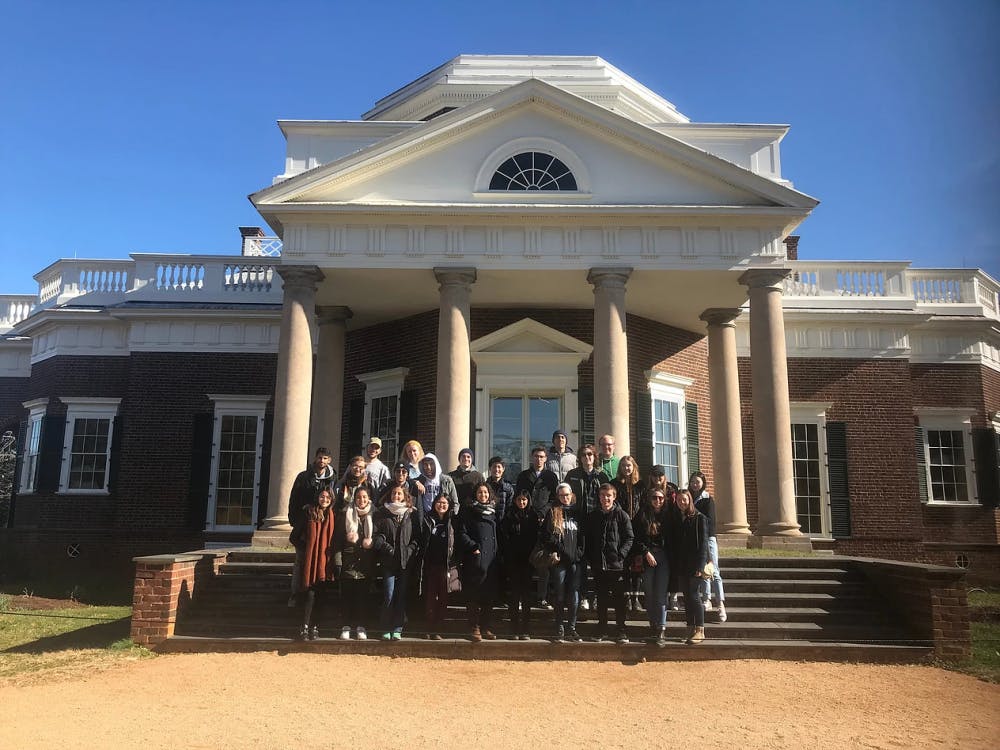At about 2:15 a.m. March 1, 2011, a first-year College student arrived at Martha Jefferson Hospital seizing and foaming at the mouth. He was later transported to the intensive care ward at the University Medical Center, where he was treated for an electrolyte imbalance in his blood. According to court documents, the student - a Zeta Psi pledge - had consumed an entire bottle of soy sauce at the Zeta Psi house before being brought to the hospital. He was released from the hospital four days later.
The fate of Zeta Psi members involved in the incident continues to hang in the balance, as an investigation by University Police and administration to determine whether hazing was involved is still ongoing. Since hazing is considered a serious criminal offense in the commonwealth of Virginia, along with a violation of University policy, the students, if found guilty, would be subject to criminal charges in addition to separate penalties - up to and including expulsion from the University - imposed by University judiciary processes.
Even larger questions loom over the University's Zeta Psi chapter. If the March 1 incident is labeled hazing, what kind of sanctions will be imposed on the fraternity? Will they mimic the kind of undisclosed punishments administered by the national headquarters of Kappa Sigma on its University chapter last spring? Or will they bring about the demise of the fraternity all together? What kind of implications might this have for the University's Greek system as a whole? Past incidents serve as possible answers to these questions.
A firm slap on the wrist\nLast spring Kappa Sigma's University chapter was sanctioned by its national body for violating the organization's code of conduct. Kappa Sigma Executive Director Mitchell Wilson attributed the sanctions to "some inappropriate activities with pledges," and declined to elaborate.
The chapter was then placed on Trustee Status, meaning an alumnus was assigned to work with the chapter during the past year to get it back on the right track. According to Wilson, the fraternity's value structure was revisited to ensure the chapter's programs were conducted within the standards of the organization. Despite the supervision, the chapter has continued to conduct its own recruitment efforts.
"It has been a tremendous success," Wilson said. "We are very pleased with everything the chapter has accomplished and with the position they find themselves in today."
Although the chapter continues to operate under Trustee Status, Wilson said it is making substantial progress in meeting requirements and should return to normal operation soon.
"These young men have responded over the course of the past year and I think that they will continue to respond," Wilson said. "This is our founding chapter, and we want our founding chapter to be one of our very strongest, and I think we have a quality group of young men at the University."
Other fraternities which have faced similar issues in the past few years have not been so lucky.
A brotherhood finds new life\nThe Mu Chapter of Alpha Epsilon Pi had a steadfast presence at the University since 1924 until the summer of 2009. In mid-May of that year, the fraternity's national chapter suspended the Mu brothers for 30 days pending an investigation into alleged hazing. Adam Smith, the chapter president at the time, said he was mystified by the decision, claiming Nationals failed to clarify what facts lay behind the investigation.
At the end of the 30-day suspension, Nationals told the Mu Chapter it was being reorganized, citing low occupancy in the house and general concerns about chapter operation in addition to the hazing allegations as reasons for reorganization. Smith said Nationals' accusation of "declining rush numbers" was unfounded, as the chapter recruited an above-average 14 new members the previous fall.
Speculation surfaced that the decision was influenced by the chapter's declining Jewish membership. The chapter's increasingly non-Jewish brotherhood, exemplified by Smith being its second consecutive non-Jewish president, may not have sat well with officials of Alpha Epsilon Pi, self-described as an international Jewish fraternity.
Alpha Epsilon Pi Executive Director Andrew Borans denied such discriminatory accusations, saying the decision to close the chapter ultimately rode on the hazing allegations.
"What's the debate if you're breaking the rules?" Borans said. "If there's a question about breaking the rules, that's a different story. If it's determined that you're hazing, where is the negotiation? How would you with a straight face even have a negotiation?"
The decision was particularly frustrating for the chapter's pledge class, as it came at the culmination of a semester's worth of pledging.
"I speak for my pledge class when I say we were all pretty angry," third-year College student Jon Crespy said. "It happened so soon after being initiated. We never really had much of an opportunity to be brothers after spending all that time as pledges."
In line with standard procedures associated with reorganization, a Nationals representative interviewed 25 of the chapter's members to determine which former brothers would be reinstated. Thirteen brothers were offered invitations to return, but none of them accepted.
Former Mu Chapter brothers were approached the following spring by University alumni of Alpha Delta Phi, a fraternity shut down in 2003 as a result of dwindling membership numbers. Twelve former brothers of the Mu Chapter pledge class joined Alpha Delta Phi in the fall of 2010 to bring the fraternity's total to 25 members, Crespy said. Alpha Delta Phi President Frank Chin, a former member of the 14-man Alpha Epsilon Pi pledge class, said he hopes the chapter will be officially recognized in the spring of 2012, although that decision rests with the University and the Inter-Fraternity Council.
Borans said Alpha Epsilon Pi will be completely renovating its house and returning to the University this coming fall. IFC President Neil Holby, however, said Alpha Epsilon Pi nationals have not contacted the IFC during the past six months and do not have an active file to seek recognition.
A different route to brotherhood\nAlpha Epsilon Pi was not the only fraternity to face suspension in the fall of 2009. Sept. 21, national headquarters for the Sigma Phi Epsilon fraternity, in conjunction with University officials, revoked the University's Virginia-Eta chapter's charter. Nationals gave brothers living in the Sigma Phi Epsilon house 30 days to find off-Grounds housing and clarified that the fraternity would not be allowed to reorganize on Grounds for at least three years.
Sigma Phi Epsilon Executive Director Brian Warren pointed to a string of incidents Nationals felt were detrimental to the fraternity's reputation as the reason for the decision, noting that no particular occurrence caused the shutdown. In a recent statement to The Cavalier Daily, Warren said the charter was revoked for "life safety concerns," noting that reports from parents and members left Nationals and the University no choice but to withdraw the charter.
One particular incident stirred up trouble occurred during a rush event the previous semester. Known as "Car Bash," Sigma Phi Epsilon recruits smashed a junkyard car to pieces in the back lot of the Sigma Phi Epsilon house. One brother then lit the car on fire, which prompted a neighbor to call the police. The IFC put the chapter on social probation for the rest of the semester.
Warren, a Sigma Phi Epsilon member who graduated from the University in 2004, said he did his best to prevent his former chapter from closing in the months leading up to the decision. He cited a letter he wrote to the IFC in February of 2009 which stated Nationals thought highly of then-Virginia-Eta President Alex Ehrnschwender and that they would continue to provide the chapter with everything they needed to be successful. Warren also noted that he did not get to vote on the decision, since charter authority ultimately rests with the fraternity's National Board of Directors. He did, however, have to deliver the bad news to the chapter. "It was the most difficult thing I have ever done," he said.
Spring semester pledges of 2009 were told by Sigma Phi Epsilon brothers to never wear "SigEp" Greek-lettered apparel, as it would associate them with a national organization which did not represent their true character. Virginia-Eta members particularly resented Nationals' new "Balanced Man Program," which Warren said was meant to challenge stereotypes regarding fraternities by making them a more integral part of the education process.
"This new 'Balanced Man Program' would be more of a recreational learning center than a fraternity," Ehrnschwender said in the wake of the chapter's disbandment. "We strongly value traditions at SPE and value the traditional SPE chapter."
Although the chapter is still not recognized by the IFC, many former Sigma Phi Epsilon members continue to live together and operate as a de-facto fraternity. With the help of their Alumni Board, Sigma Phi Epsilon brothers held an open house during IFC Rush, during which they gauged the interest of numerous first years despite admitting their un-official status, ultimately attracting seven recruits, an anonymous brother said. They hope to obtain an independent IFC charter in the fall of 2012 and, with the help of alumni, move back into their house on 150 Madison Lane. Warren said he hopes to bring back the Virgina-Eta chapter "very soon."
Is the Greek system worth it?\nWith repeated hazing incidents cropping up at universities across the country, some say the Greek system is on the decline. These people also point to the fact that a growing amount of diverse organizations on college campuses has made joining a fraternity less of a social need, and that rising tuition costs make some hesitant to spend more money to join social clubs.
Despite this negative perception, it appears Greek life at the University may be on the rise. Michael Citro, assistant dean of students and director of fraternity and sorority life at the University, said the average fraternity chapter size has increased from 54.3 members per chapter to 55.82 members per chapter from the spring 2008 semester to the spring 2011 semester. Moreover, the average new member class size has increased from 14.63 new members per chapter in 2008 to 16.93 new members per chapter in the spring semester 2011. Additionally, the number of men accepting membership bids in IFC fraternities has increased from 439 in 2008 to 474 in 2011. The sorority community has also experienced considerable growth, including the recent re-colonization of Sigma Delta Tau.
"Fraternities and sororities provide an incredible outlet for undergraduate students to gain experience in leadership positions, to serve their community, to contribute to philanthropic causes and to embrace the ideals of brotherhood or sisterhood," Citro said in an email. "While there have been isolated risk management concerns, the fraternity and sorority community remains strong, healthy and positioned to provide a values-based experience for undergraduate students."
Possibly the biggest threat to Greek life at the University is continued incidents of hazing, which has proven capable of taking down fraternities and sororities, and in some cases entire Greek systems, said retired Pennsylvania Judge Mitch Crane, an anti-hazing advocate. Crane, a former keynote speaker who has spoken at more than 400 college campuses about hazing and other risk management issues, said increasing abuse of alcohol by minors during the last 30 years, along with other factors, has made hazing a more visible part of Greek life.
"We have more serious incidents these days than ever before in which people are seriously injured and unfortunately even killed sometimes," Crane said. "One of the reasons that it's so pervasive is that people are joining organizations where proving trust is something they're required to do, and they therefore have to prove their trust by doing whatever they're taught to do and don't believe anything bad is going to happen to them."
Still, many University students believe the benefits of hazing outweigh the rare instances of trouble.
"What opponents of hazing don't realize is that its main goal is to bring pledge classes together and make them respect and earn the house that they're dedicating a semester - and, in turn, a few years - to," an anonymous University fraternity member said. "More often than not, it's a worthwhile way for prospective members to get to know each other, get to know the brothers, and get to know a little more about themselves."
Most University fraternities take numerous precautions to avoid trouble with hazing. Each University chapter, for example, is required to complete a Fraternal Organization Agreement (FOA), which requires educational sessions about hazing, alcohol abuse, sexual assault and other potential issues a Greek organization might face. In addition, many national organizations provide their chapters with a set of rules they are required to follow to remain in good standing.
"There's actually a lot of rules that fraternities live under that I think most people aren't aware of," another fraternity member said. "There really is an accountability that people try to hold to."\nThe negative perception on Greek life may also be perpetuated by media scrutiny, which often provides more coverage of fraternities' and sororities' problems than their successes. IFC President Neil Holby noted that 23,173 community service hours were reported by 44 University fraternity and sorority chapters for the fall 2010 semester, and that $78,073.33 were raised by 39 chapters for philanthropic and charitable causes that semester. He also pointed out that the overall average GPA of University fraternity members stands at 3.237, compared to 3.167 for the rest the school's male population.
Many other schools have cracked down on Greek life in the aftermath of serious incidents with pledges. University officials at Penn State, another state school with a thriving Greek scene, imposed numerous new regulations on their entire Greek system after a freshman pledge was found dead of alcohol poisoning outside a fraternity house. Other schools, such as Amherst College, Williams College and Bowdoin College, responded to incidents by banning their systems altogether.
Despite detrimental incidents of hazing, however, the state of Greek life at the University appears to be stable, if not on the rise.





